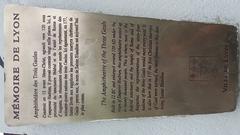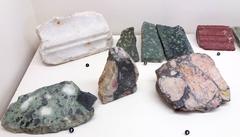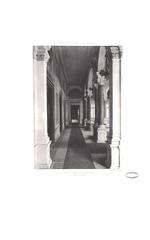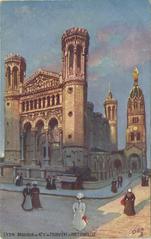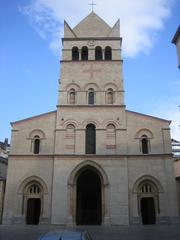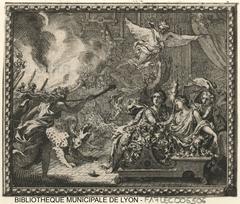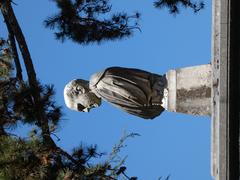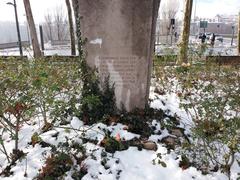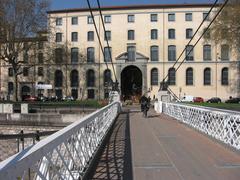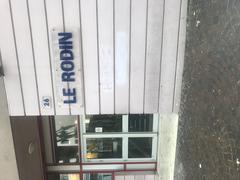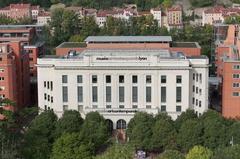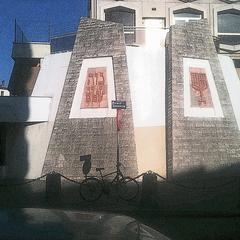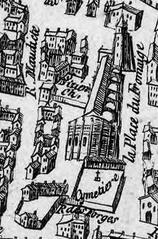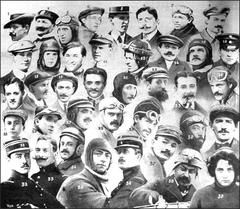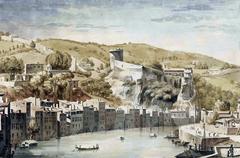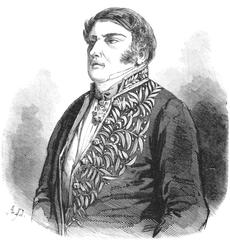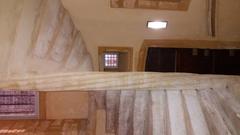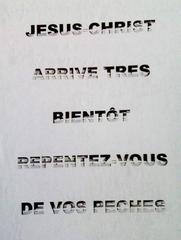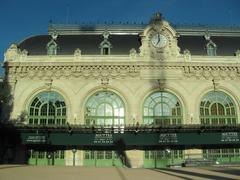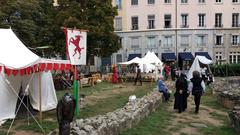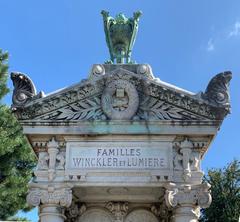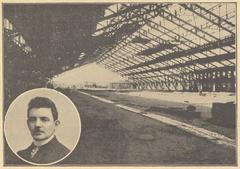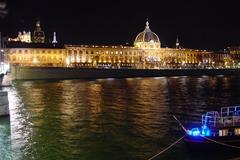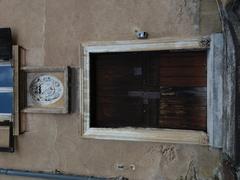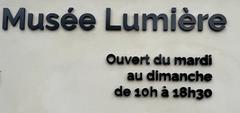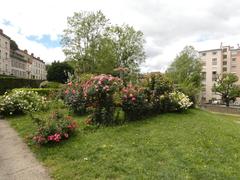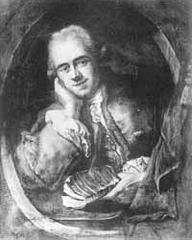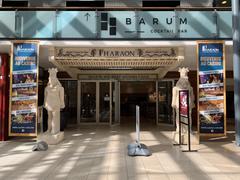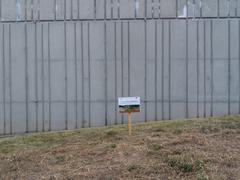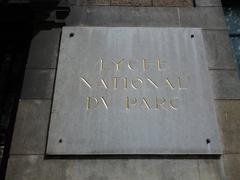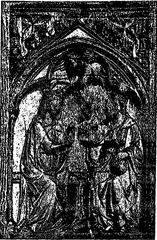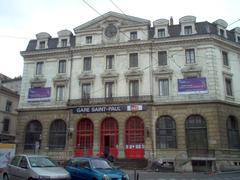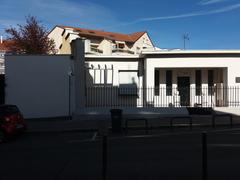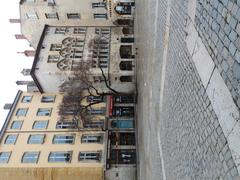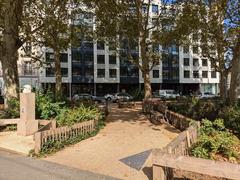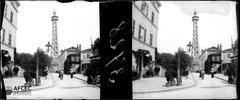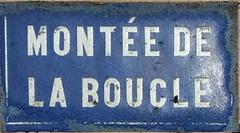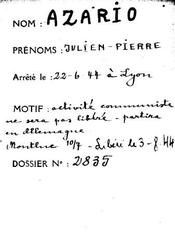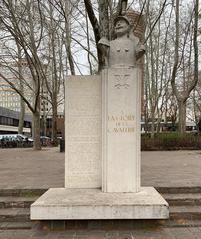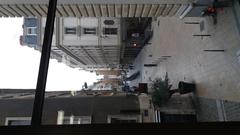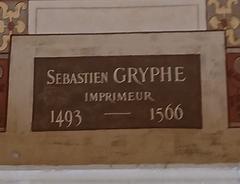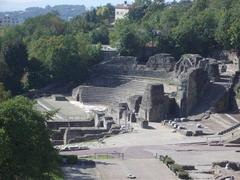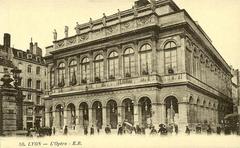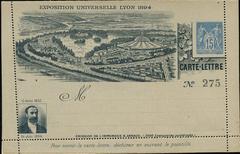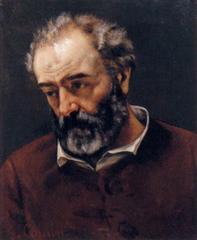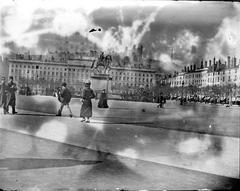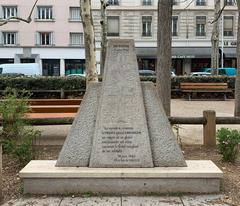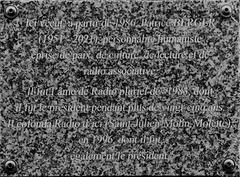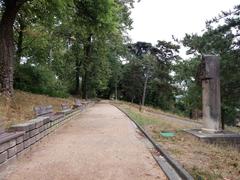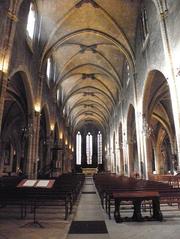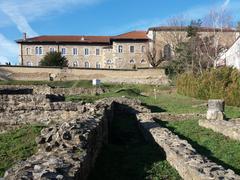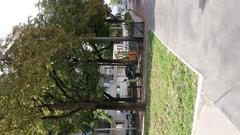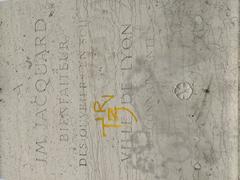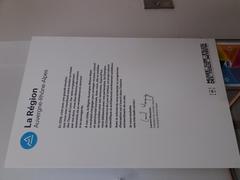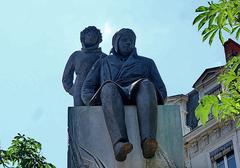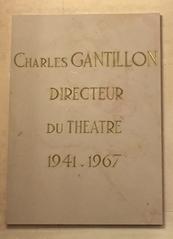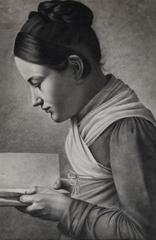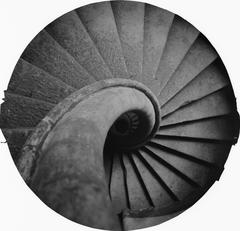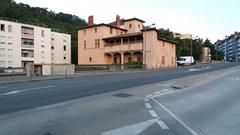
Grande Mosquée de Lyon: Visiting Hours, Tickets, and Visitor Guide
Date: 04/07/2025
Introduction
The Grande Mosquée de Lyon stands as one of Lyon’s most remarkable landmarks, representing both architectural splendor and the city’s multicultural identity. As the principal mosque of Lyon, it is not only a place of worship but also a hub for cultural exchange, interfaith dialogue, and community engagement. This detailed guide explores the mosque’s history, architectural highlights, visiting hours, ticketing, accessibility, and provides practical tips for a meaningful and respectful visit.
For current details, guided tours, and event updates, refer to the mosque’s official website.
Table of Contents
- Introduction
- Historical Background
- Architectural Highlights
- Religious and Cultural Significance
- Visiting the Grande Mosquée de Lyon: Practical Information
- Frequently Asked Questions (FAQ)
- Summary and Recommendations
- References and Further Reading
Historical Background
The Early Muslim Presence in Lyon
The roots of Lyon’s Muslim community stretch back to the 19th century, with the first significant presence marked by Emir Abd El Kader’s visit in 1852. Over the ensuing decades, particularly after World War II, Lyon became a destination for workers from North Africa, greatly contributing to the city’s industry and growth (Wikipedia). Despite their contributions, the lack of a dedicated worship space persisted, leading to makeshift prayer rooms and ongoing efforts to secure a permanent mosque.
The Path to Construction
Efforts to establish a mosque date back to the 1930s, but it wasn’t until the late 1970s and early 1980s that momentum grew, driven by civic leaders and the Association Culturelle Islamo-Française (ACLIF). After overcoming significant social, administrative, and legal challenges—including permit refusals and local opposition—the project received approval with strong support from city officials. Funding came from community fundraising and international contributions, particularly from Muslim-majority countries.
Inauguration and Symbolic Role
The mosque was inaugurated on September 30, 1994, in a ceremony attended by French and international dignitaries. This event marked a turning point in the recognition of Islam as an integral part of French society and stood as a symbol of resilience, integration, and civic partnership (Mosquée de Lyon Official Site; France 3 Régions Article).
Architectural Highlights
Exterior Design
The mosque’s architecture harmoniously blends Persian, Maghrebi, and contemporary styles. Its pristine white façade is punctuated by a 25-meter-high minaret, a visual and symbolic beacon in Lyon’s 8th arrondissement (lyon.fr). Elegant Persian arches, intricate geometric patterns, and a glass pyramid over the entrance patio supported by 230 columns define its unique exterior.
Interior Spaces
- Prayer Hall: Accommodates up to 3,000 worshippers, with capacity swelling during major festivals. The mihrab, adorned with blue mosaic and the shahada (Islamic creed), serves as the spiritual heart of the mosque.
- Dome: The dome rests on an octagonal base, painted with symmetrical motifs inspired by Ottoman architecture, and features the illuminated “Verset du Trône” (Ayat al-Kursi) encircling its base (assurancemosquee.fr).
- Materials: High-quality marble and light-colored stone enhance both durability and luminosity, while intricate calligraphy and geometric designs reflect Islamic art traditions (mosquee-lyon.org).
- Additional Facilities: The mosque also includes classrooms, a library, multipurpose rooms, and the adjacent Institut Français de Civilisation Musulmane (IFCM), a cultural center for exhibitions and lectures.
Gardens and Patio
The garden and central patio, with their fountains and shaded trees, evoke the traditional Islamic concept of paradise and offer a tranquil space for contemplation.
Religious and Cultural Significance
Spiritual and Community Center
The Grande Mosquée de Lyon is the heart of Lyon’s Muslim life, hosting daily prayers, Friday congregational prayers, and special religious services for Eid al-Fitr and Eid al-Adha (Wikipedia). It also provides religious education for children and adults, reinforcing both faith and cultural identity.
Cultural Engagement
Beyond worship, the mosque is a center for intercultural dialogue and education. It organizes lectures, seminars, exhibitions, and hosts European Heritage Days, inviting non-Muslims to learn about Islam and Islamic art (Petit Futé). The adjacent IFCM furthers these objectives with regular cultural programming.
Social Outreach
The mosque actively supports the community through social services, including a food bank, humanitarian aid, and counseling. It is also a leader in halal certification through the Association Rituelle de la Grande Mosquée de Lyon (ARGML), which ensures compliance with Islamic dietary laws (Wikipedia).
Interfaith Dialogue
As a symbol of modern French Islam, the mosque promotes tolerance and understanding, regularly opening its doors for guided tours, school visits, and interfaith events (kawa-news.com).
Visiting the Grande Mosquée de Lyon: Practical Information
Location and Access
- Address: 146 Boulevard Pinel, 69008 Lyon, France
- Public Transport: Take tram line T4 (États-Unis – Viviani stop) or Metro Line D (Laënnec station); several bus lines and Vélo’v bike stations are nearby.
Visiting Hours
- General Hours: Open daily except Fridays, from 9:00 AM to 12:00 PM and 2:00 PM to 6:00 PM (lyon.fr).
- Religious Holidays: Hours may vary during Ramadan and major Islamic festivals; always check the official website for updates.
Tickets and Entry
- Admission: Free for all visitors. Donations are welcome to support maintenance and community initiatives.
Guided Tours
- Availability: Guided tours are offered (except Fridays and prayer times) in French and English. Advance booking is strongly recommended, particularly for groups or during high season (mosquee-lyon.org).
- Educational Groups: Special programs are available for schools and cultural organizations.
Accessibility
- Physical Access: The mosque is wheelchair accessible, with ramps and accessible restrooms. Staff can assist visitors with special needs.
- Dress Code: Modest clothing is required—shoulders and knees covered. Women are encouraged to cover their hair (scarves are often available at the entrance). Shoes must be removed before entering the prayer hall.
Visitor Etiquette and Photography
- Behavior: Maintain a respectful and quiet demeanor, especially during prayer times.
- Photography: Allowed in public areas and the gardens; permission is required for interior spaces, particularly during religious ceremonies. Always ask before photographing people.
Facilities
- Library and Bookshop: Access Islamic literature and purchase educational materials.
- Community Services: Social support, counseling, and charity initiatives are available.
- Events: Participate in cultural festivals, lectures, and open days throughout the year.
Nearby Attractions
- Parc de la Tête d’Or: Lyon’s largest urban park with botanical gardens and a zoo.
- Musée des Confluences: A renowned science and anthropology museum.
- Vieux Lyon: The city’s historic Renaissance district.
- Other Religious Sites: The Cathédrale Saint-Jean and Grande Synagogue are nearby and often included in interfaith tours.
Frequently Asked Questions (FAQ)
Q: What are the visiting hours for the Grande Mosquée de Lyon?
A: Open daily except Fridays, from 9:00 AM to 12:00 PM and 2:00 PM to 6:00 PM. Check ahead during Ramadan and holidays.
Q: Is there an entrance fee?
A: Entry is free; donations are welcome.
Q: Are guided tours available?
A: Yes, guided tours can be booked in advance, especially for schools and groups.
Q: Is the mosque accessible for people with disabilities?
A: Yes, with ramps, accessible restrooms, and staff assistance available.
Q: Can I take photographs inside the mosque?
A: Photography is allowed in public areas; permission is needed for interior or ceremonial photography.
Summary and Recommendations
The Grande Mosquée de Lyon is much more than a place of worship: it is a living symbol of faith, cultural dialogue, and community cohesion. Its rich history, from early struggles for recognition to its role today as a beacon of modern French Islam, is reflected in its architecture and ongoing programs. Visitors are welcomed to explore its serene spaces, learn about Islamic art and culture, and participate in events that foster understanding and tolerance.
For an optimal experience:
- Confirm visiting hours and book guided tours in advance.
- Dress modestly and follow visitor etiquette.
- Explore nearby Lyon historical sites to enrich your visit.
Download the Audiala app for guided tours and exclusive content on Lyon’s heritage. Follow us on social media for news and travel tips.
References and Further Reading
- Mosquée de Lyon Official Site
- Wikipedia
- Lyon.fr
- Visiter Lyon - Grande Mosquée
- Kawa News - Grande Mosquée de Lyon: Culture and Tolerance
- Sacred Destinations - Lyon Mosque
- Petit Futé - La Grande Mosquée de Lyon
- France 3 Régions Article









